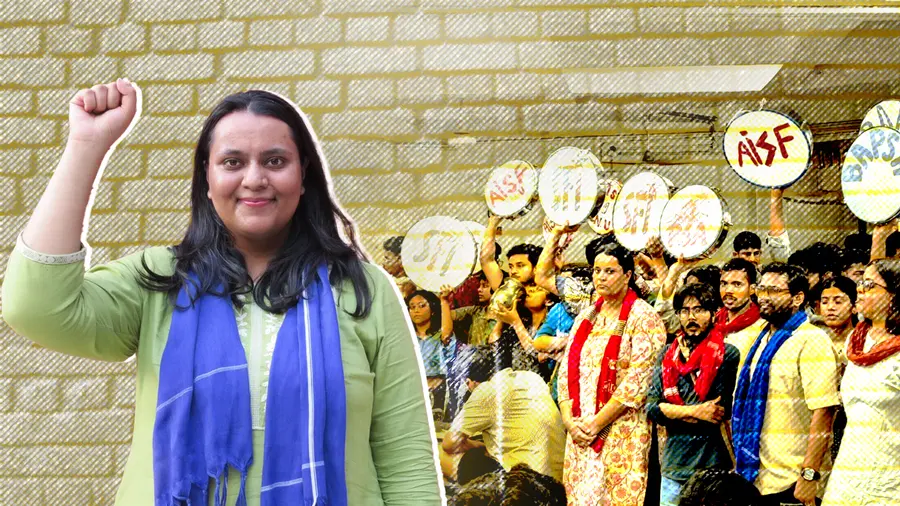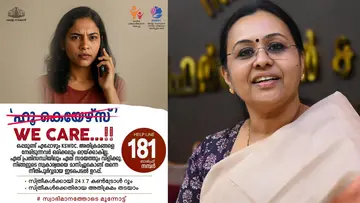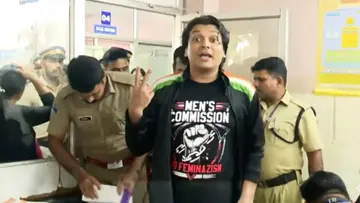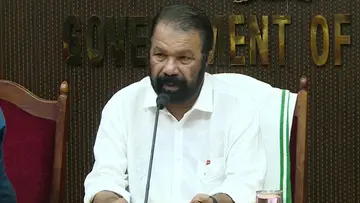Breaking the Blackout: A Tribal Muslim Girl’s Rise in JNU Campus

Choudhary Tayyaba Ahmed

Web desk
Published on Apr 22, 2025, 05:04 PM | 3 min read
When the central government revoked the special status of Jammu and Kashmir, it wasn’t just a constitutional shift—it was the spark that set an entire state on the path of resistance. Protests erupted from every corner, a collective resilience rising from the valleys and mountains. In response, the government didn’t just deploy security forces—it silenced the people. A sweeping internet blackout descended over the region, cutting off millions from the world beyond under the guise of curbing misinformation. Then, as the globe was gripped by an invisible enemy—COVID‑19—the silence deepened. Where the world turned to digital lifelines for connection, education, and hope, Kashmir was left in darkness. For the people of Jammu and Kashmir, even the cold glow of a screen was a distant dream.
Amidst this enforced isolation, Choudhary Tayyaba Ahmed—a Tribal Muslim girl from a small village in Poonch—stood defiant. Having secured admission to Jawaharlal Nehru University’s MA Geography program in 2020, she found her digital bridge to learning locked shut. Yet she refused to surrender: she studied harder, pushed further, and rose above every obstacle, becoming a quiet symbol of resilience and rebellion.
Her pursuit of education didn’t stop there. In 2024, she cleared the JRF and returned to JNU as a PhD scholar in the Centre for Law and Governance. Now gearing up to contest as the Left‑Ambedkarite Panel’s presidential candidate in the upcoming JNUSU election, she has been a tireless advocate for student rights on campus. Tayyaba holds JNU’s democratic values in the highest regard and has consistently stood firm against the RSS–BJP–ABVP–administration nexus.
She warns that even within JNU elections, the ABVP resorts to intimidation tactics. During the candidate‑withdrawal period, ABVP members allegedly pressured other candidates to withdraw, undermining the fairness of the process. According to her, the campus election commission itself struggles to function freely due to constant interference and threats.
From rewriting history textbooks and injecting Hindutva ideology into curriculam, to banning progressive student organisations and targeting dissenting voices under the guise of nationalism, the BJP has long been encroaching on academic spaces. In response, Tayyaba draws strength from the ideals of Bhagat Singh and Dr. B R Ambedkar, determined to challenge the RSS–BJP–ABVP–administration combine at JNU.
The Left‑Ambedkarite Unity Panel has chosen her to lead what they describe as a “historic and necessary” alliance in this year’s JNUSU elections. Alongside Tayyaba are Ram Niwas (BAPSA) for General Secretary, Santosh Kumar (AISF) for Vice‑President, and Nigam (PSA) for Joint Secretary. The coalition includes the Students’ Federation of India (SFI), Birsa Ambedkar Phule Students’ Association (BAPSA), All India Students’ Federation (AISF), and Progressive Students’ Association (PSA). They say this formation goes beyond electoral strategy—it’s the culmination of ongoing student struggles, notably last year’s #ShutDownDoS movement against administrative overreach and fee hikes.
To preserve democratic spaces within universities—spaces that nurture dissent, growth, and the right to question—the alliance emphasises the need to maintain academic freedom. “We’re not just coming together for an election. This is about fighting for the soul of JNU: standing up to commercialisation, communalisation, and caste oppression,” said an SFI representative at the alliance’s announcement. With a historic slate and a broad ideological vision, the Left‑Ambedkarite alliance seeks to reshape JNU’s political landscape and push back against the rising influence of the ABVP–administration combine.










0 comments